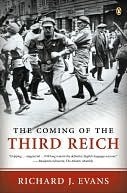Papen’s utopian conservatism did scant justice to the political realities of 1932. Papen’s cabinet was made up of men with relatively little experience. So many of them were unknown aristocrats that it was widely known as the ‘cabinet of barons’. In the discussions that preceded Brüning’s resignation, Papen and Schleicher had agreed that they needed to win over the Nazis to provide mass support for the anti-democratic policies of the new government. They
Welcome back. Just a moment while we sign you in to your Goodreads account.


